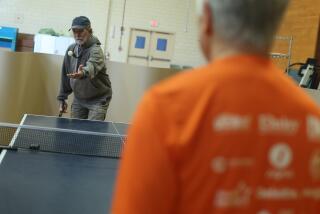At 74, He Says You’re Not Too Old to Grow Up
- Share via
Dr. James Birren is a rare combination of ideas and action, seriousness and play. And at 74, he guides the Anna and Harry Borun Center for Gerontological Research for UCLA.
He has researched and written about topics such as decision-making in the older consumer and the power of self-healing and insight through autobiography. If there is a central theme to his work, it is that one is never too old to grow up.
After more than 40 years in the field of gerontology, Birren says he still ponders the idea of how a person plays the hand of life, what the outcomes are and how one learns from them.
“I learned from a Japanese Buddhist that with age, relationships ripen and one can finally allude to things of the heart without speaking directly of them. That relationships as well as things mature . . . things take on a value with the passage of time rather than lose value.
“Unfortunately, American society seems to have more of a fresh-from-factory kind of outlook on life where as soon as a person is ‘unwrapped,’ deterioration comes with aging, forgetting the beauty that also comes with maturing,” he said.
In his teaching and writing, Birren tries to encourage a process he calls “mature aging.” He said he has learned from his research that a mature person negotiates with life using a combination of trust and cynicism. A maturely aged person, he said, avoids extremes of right and wrong, does not waste time with what cannot be changed and recognizes that there can be many ways of approaching a problem. Maturely aged people will say things to themselves like “I’m probably making the right decision but if I’m not, well, that’s life.”
Birren developed a technique of teaching older people to help themselves by writing autobiography 15 years ago at USC, where he was the founding executive director and dean of Ethel Percy Andrus Gerontology Center--a post from which he “retired” in 1989.
“You don’t know where you’re going unless you know where you’ve been and where you are now,” he said. “Writing about your life is a beginning. It’s possible to free yourself of holds that are restricting or interfere with your ability to have a future.”
Birren said he has concluded that the well-being of an individual revolves around a core of four “fitnesses”: physical, intellectual, social and purpose. All are important, but it is purpose fitness that generates self-esteem and a sense of control over one’s life, and that is the topic that occupies much of his research time at UCLA.
“I want to teach and explore the process of decision-making in older people, showing how it affects their lives. I want to develop videos showing older persons being victimized and then discuss what would improve certain decisions--like having a certain operation or whether they should buy a warranty along with their television set. I want to help older people get more out of their resources by something so simple as just talking to someone else before making a decision,” he said.
For Birren, a rewarding professional life and a rewarding personal life are linked in ways he says he couldn’t even imagine when he was much younger. He has learned much, he said, in the 50 years he has spent with his wife, Betty.
“When I was younger,” he said, “it was important to be open and candid with my wife while facing the constant dilemma of exposing myself emotionally and worrying whether she was doing the same. Now, after all those years of testing each other’s honesty, we have a loyal companionship. We know each other and we don’t tread on tender spots. It has never been as full.
“After all, a man becomes a man because of the women in the relationship and vice versa. The topic of the sexes tends to place too much emphasis on what men do and what women do when it’s really about a duet,” he said.
If there is such a thing as celebrity status in gerontology, James Birren is a star. His published output totals more than 250 articles and books. He waited until he was 65, however, to begin hanging the many awards he has received on what he calls his “ego wall”
“By that time, you can put up with your ego,” he says.
In James Birren’s world, aging has a future. At his new assignment as associate director for the Center on Aging at UCLA, his challenge is to develop undergraduate education on issues of gerontology, and to encourage faculty research on the issue.
More to Read
Sign up for Essential California
The most important California stories and recommendations in your inbox every morning.
You may occasionally receive promotional content from the Los Angeles Times.













